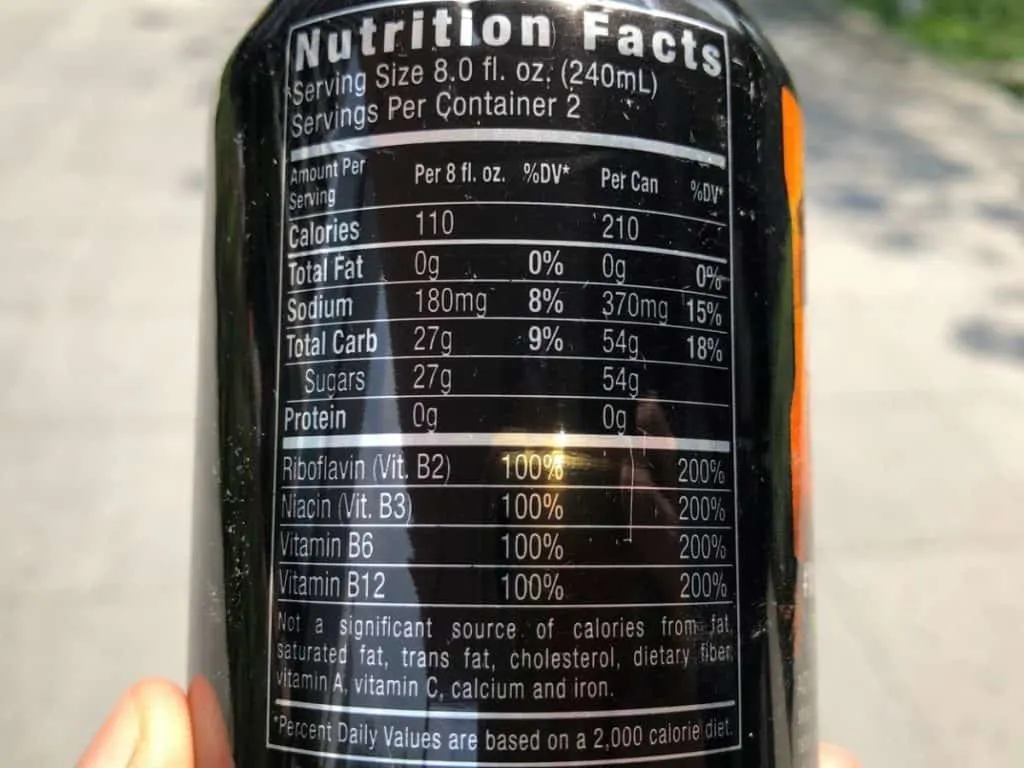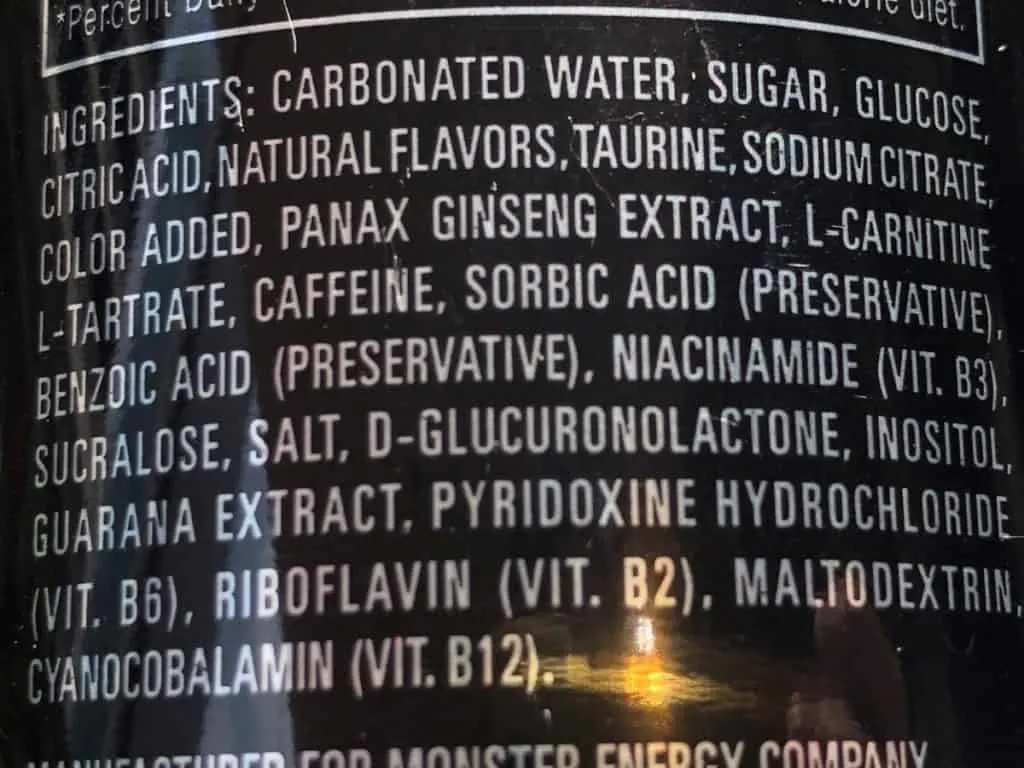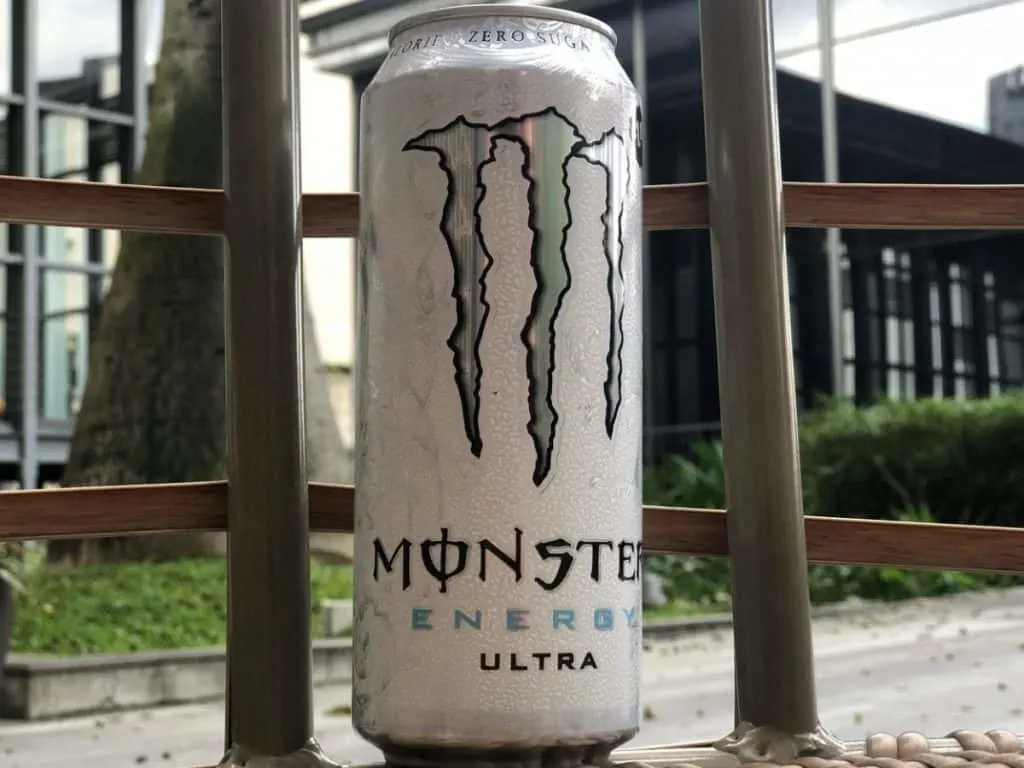One of the most prominent energy drink brands in the world is Monster.
You will definitely recognize a can of Monster Energy when you see one, with its iconic logo a familiar sight to anyone with a passing knowledge on energy drinks.
Of course, being one of the most popular energy drinks come with a fair bit of controversy, and you’re probably wondering whether or not does Monster gives you the boost you need or is simply an overhyped soda with unhealthy amounts of sugar and caffeine.
Coming to the point, as long as you’re relatively healthy, don’t have any pre-existing medical conditions, and know how to practice moderation,
A can of Monster Energy shouldn’t be bad for you, and not worse than a cup of sweetened coffee.
To find out more about Monster Energy and whether or not it’s actually bad for you, just read on to find out.
Contents
Monster Energy Nutritional Facts
| Daily Values | Monster Energy (16 fl.oz) |
| Calories | 101 calories |
| Sodium | 370mg |
| Potassium | 7.2mg |
| Carbohydrates | 54g |
| Sugars | 54g |
| Dietary Fiber | 0g |
| Caffeine | 160mg |
| Cobalamin | 100% |
| Vitamin B6 | 100% |

How Many Calories Are In A Regular Monster?
A regular 16 fl.oz can of Monster Energy has 210 calories, which is fairly large amount.
A Calorie is a unit of energy, which you provide to your body through the food you eat. It generates energy in the form of heat so that your body can function effectively.
Generally, the required amount of calories suggested by the NHS is 2000 for women, and 2500 for men, although, it also depends on various factors like age, metabolism, physical activity, etc.
When you ingest calories, some of them are used as a source of energy so as to help your body function effectively, while some are stored as fats.
A regular can of Monster will run you around 210 calories, which is about 1/10th of your daily caloric intake already; great for a quick boost, not so much if you want to stay on the healthier side of life, especially if you have multiple cans a day.
So be sure to moderate your overall caloric intake, and keep your Monster Energy drinks to a tolerable minimum, especially if you’re the type who lives a more sedentary lifestyle.
Monster Energy Ingredients
A quick look at the ingredients of Monster Energy and what goes on in the formula:
- Carbonated Water
- Sugar
- Glucose
- Citric Acid
- Natural Flavours
- Taurine
- Sodium Citrate
- Color Added
- Panax Ginseng Extract
- L-Carnitine L-Tartrate
- Caffeine
- Sorbic Acid
- Benzoic Acid
- Niacinamide (Vitamin B3)
- Sucralose
- Salt
- D-Glucuronolactone
- Inositol
- Guarana Extract
- Pyridoxine Hydrochloride (Vitamin B6)
- Riboflavin (Vitamin B2)
- Maltodextrin
- Cyanocobalamin (Vitamin B12)

Monster Energy Caffeine Content
A single can of Monster (16 fl.oz) contains 160mg of caffeine, which is pretty average as an energy drink
| Energy Drinks | Caffeine Content |
| Monster Energy | 120mg per 12 fl.oz |
| 5-Hour Energy | 200mg per serving |
| Rockstar Punched | 180mg per 12 fl.oz |
| Full Throttle | 120mg per 12 fl.oz) |
| NOS | 120mg per 12 fl.oz |
| Burn | 113.5mg per 12 fl.oz |
| Red Bull | 113.5mg per 12 fl.oz |
| Amp Energy Original | 106.5 mg per 12 fl.oz |
Caffeine, which most of us consume every day in our tea and coffee (and is present in just about every energy drink) acts as a stimulant, affecting the central nervous system.
it’s also a common ingredient in medications to treat or manage drowsiness, headaches, and migraines, and the FDA considers it both a drug and a food additive.
Returning back to Monster Energy, each 16 fl.oz can has 160mg of caffeine which is average for an energy drink, although given that a regular cup of coffee is only around 95mg of caffeine per serving, it might be a bit much if you’re not used to it.
For reference, the FDA set a daily max caffeine intake of no more than 400mg, although given your personal metabolism and caffeine tolerance, your max tolerable intake may very well vary from those numbers.
That being said, t’s pretty important to keep your overall daily caffeine intake in-check, as having too much caffeine and going over your tolerance can lead to :
- Disrupted sleep
- Uneven heartbeat
- High blood pressure
- Headaches
- Anxiety
- Dizziness
- Dehydration
- Irritability
- Heartburn
- Stomach upset, Diarrhea, and Nausea
Caffeine Dependency And Addiction
Caffeine dependency means being dependent on caffeine throughout your daily life. So, if you’re unable to function without your daily cup of coffee or energy drink fix in the morning and you “have to have it,” you may be dependent on caffeine.
So if you want to avoid the above, its alway best to keeping an eye on your daily caffeine habits, simply noting the caffeine content of beverages and keeping track of your daily intake should help in reducing your desire for a caffeinated beverage.
For more information on caffeine addiction and the possible signs and symptoms of caffeine withdrawal, have a look at the video below:
How Much Sugar Is In Monster Energy?
A regular can of Monster Energy will run you around 52g of sugar per 16 fl.oz, which is definitely quite a lot more than what you should be having a day.
Sugar is often found in energy drinks because as the name suggests “Energy”, which is calories, and sugar is a high-calorie substance.
Moreover, Sugar is also a rather addictive ingredient in energy drinks, as sugar releases dopamine in your system, temporarily improving your mood and making you crave more of it to get the same feeling.
As such, energy drinks can potentailly be habit-forming, not just due to the caffeine, but the sugar as well, so be aware of that if you do find yourself reaching for more cans of Monster than strictly necesarry.
Why Sugar Is Bad For Your Health
The feeling of energy you get from a can of Monster is pretty short-lived, as sugar is a fairly easy source of carbs. You’re also very likely to suffer from a sugar crash due to the spike fall in your blood sugar levels after consuming an energy drink:
Short-term over consumption of sugar may have the following symptoms:
- Irritability
- Increased Glucose levels
- Headache
- Fatigue
- Forgetfulness
While the above may seem pretty bad in isolation, an excessive amount of sugar in your long-term diet can lead to the following (and arguably worse)
- Diabetes (Type 2)
- Heart Problems
- Acne
- Cavities/tooth decay
- Metabolism Disturbances
- Weight Gain
- Cholesterol
According to the AHA, the daily maximum amount of added sugar you should be having daily should be no more than 9 teaspoons (36 grams or 150 calories) for men and no more than 6 teaspoons (25 grams or 100 calories) for women
At 54g per 16 fl.oz can, Monster Energy definitely has a lot more than what would be considered a ‘reasonable’ amount of sugar, so while it may be great for a temporary sugar rush, be well aware that having a can of the stuff isn’t beneficial for your health.
Does Monster Energy Use Artificial Sweeteners?
Monster Energy does use sucralose in addition to its already high sugar content, possibly to improve it’s overall flavor.
Sucralose is one of the most popular artificial sweeteners and is calorie-free, meaning it probably won’t add anything nutrition-wise to your diet either.
Although sucralose is considered safe to eat and is included in food by government authorities, there have been concerns about the side effects of artificial sweeteners, so do keep your intake to a minimum.
Is Monster Energy Drink Healthy?
Personally, I cannot claim that Monster Energy is healthy as there is a noticeably high amount of caffeine and sugar are in a single can.
Knowing how much energy drink your body can handle is crucial. Some people can drink more than the suggested amount of energy drink. While some can function fine without any.
There are many different effects on different individuals of Monster Energy Drink.
But here is a list of side effects that you should be aware of if you do find yourself a can of Monster far too often:
- Anxiety
- Insomnia
- Increased heart rate
- Restlessness
- Palpitations
If you start experiencing any of the above, it’s probably for the best to put that can of Monster down and opt for some old-fashioned water instead.
Is Monster Zero Ultra Better Than Regular Monster?

| Monster Energy (16 fl.oz) | Monster Zero Ultra (16 fl.oz) | Max Daily Limits (Female/Male) | |
| Calories | 210 calories | 10 calories | 2000/2500 calories |
| Caffeine | 160mg | 160mg | 400mg |
| Sugar | 52g | 0g | 25g/36g |
From a nutritional perspective, Monster Zero Ultra (or sugar-free Monster), is definitely a lot better for you than regular Monster due to much lower amount of sugar and calories.
As a quick summary between the two different version of Monster:
- Monster Zero Ultra has a lower amount of calories than Regular Monster (10 calories vs 210 calories)
- Monster Zero Ultra has less sugar than regular Monster (0g vs 52g)
- Both Monster’s have the same amount of caffeine (160mg per 16 fl.oz)
As such, sugar-free Monster is definitely a lot better for you, especially if all you need is a daily caffeine fix.
How Many Cans Of Monster Can You Have A Day?
Keeping an eye on the amount of Sugar and Caffeine present in a single can of Monster, In my opinion, you should probably only have 1 can of Monster a day due to its absurdly high sugar content.
You should only be drinking energy drinks when necessary or occasionally, as sometimes there is a real need for a boost of energy, but you really should not get your energy supply from energy drinks every day.
Moderation of what goes in your body is very important for your overall health.
Luckily, there are healthy ways to gain energy every day, so here’s is a list of natural alternatives to boost your energy, without all the sugar and caffeine:
- Create a good night routine
- Exercise
- Convert to a healthier diet
- Get enough sleep
Is it OK to drink Monster everyday?
Monster, like Red Bull, has 28 grams of sugar in each 8.4-ounce (248-ml) can. Even if you limit yourself to just one of these energy drinks each day, you may end up consuming too much added sugar and so harming your health.
Sugar, caffeine, and other compounds like taurine and guarana may be found in abundance in these beverages. As a result, many people develop an addiction to energy drinks due to the way their brains interact with the many substances included in them.
How many energy drinks a day is OK?
Caffeine intakes of up to 400 milligrams (mg) per day seem to be safe for most healthy persons. The quantity of caffeine in two “energy shot” beverages is comparable to the amount of caffeine in four cups of brewed coffee.
Consequently, the dangers increase when more than the recommended amount is consumed all at once. This may put your body at risk from apparent caffeine toxicity, which can lead to irregular heartbeats, high blood pressure, shaking, and other symptoms that mimic a stroke. These may all be potentially lethal.
Monster Energy Alternatives
If you enjoy Monster Energy, here are some alternatives that you might find interesting as well:
Final Thoughts
I believe Monster energy does works very well, ‘to provide energy’, so long as not much else is expected of it, and that you’re well aware that consuming all the caffeine and sugar present on the regular isn’t great for your health.
While having a can of Monster can definitelly give you a temporaroy boost, you should be more concerned about your body and well-being, and probably shouldn’t be too dependent on them in the long-run
Because, as you can summarize till now, a can of Monster isn’t all that great for your health in the long-run, especially if you’re the type to have it daily.
In my opinion, You should only have Monster when you think it is necessary for you (For example, you have to drive for the whole night, have to submit an assignment tomorrow and you feel the need to delay your sleep, etc.).
So as long as you have you Monster in moderation and only when you need it, it definitely won’t be too bad for you.
